- Home
- Peter Ackroyd
The Fall of Troy Page 8
The Fall of Troy Read online
Page 8
“Sir?”
“When the dogs do not bark, you must ask for a reason. That is what we were taught in Germany.”
“I don’t quite follow your line of thought.”
“There are no ruts. Ergo, no chariot wheels. This street served only for pedestrians.”
William Brand whistled. “Now that is something. I take my hat off to you, sir.”
“You have no hat. I strongly advise you to get one.”
“An American expression. I am mightily impressed.”
“It is nothing. Experience. Practice, my dear sir. I will tell you something else about the limestone, Professor. It contains mussel shells.”
“I beg your pardon?”
“Mussel shells. In the far reaches of the past, there was a freshwater or brackish lake upon this spot. Now I will show you the sword.”
Sophia was surprised at the unexpected and wholly fortuitous discovery of the weapon, but she resolved not to question her husband about the matter. Not in front of the American.
“The sword, dear Professor,” Obermann was saying, “is the symbol of Homer. It is the key to this truth.”
“Yet the sword is no proof in itself that there was a war between the Greeks and the Trojans.”
“You must not leap to conclusions.”
William Brand was surprised. “Pardon me, sir, but I am not the one leaping to conclusions. Surely—”
“You mistake me. I am not speaking of truth in your sense. I am speaking of truth in a larger sense. What is the purpose of life?”
“That’s a pretty deep subject, sir.”
“The purpose of life is to learn how to die. That is the great theme of Homer. That is the meaning of this sword. Here. It is here.” They had come up to the hut in which many of the finds were kept. “This is our holy room, Professor. I wished to take you on an extended tour as soon as you arrived, but the gods have decreed otherwise. Come.” He led the way towards the long wooden table where the most recently discovered objects were placed. “Is it not a beauty?” A piece of thin bronze was lying upon a cloth, some nine inches long and two inches broad; it was severely decayed, flaking away and mottled with vermilion and verdigris rust. “I have read your paper on the weapons found in Wisconsin, Professor. The axes were of pure copper, were they not?”
William Brand was surprised that he had seen his paper, published recently in a periodical entitled Early American Archaeology. “Of copper, yes. I am delighted that you range so far in your reading.”
“It is my business to do so. And so the question remains. From where did the Trojans obtain their tin to make bronze? And I have the answer. It came from Cornwall in England. It was carried by Phoenician traders. I was alerted when an unknown goblet was found in a little town called Mevagissey. I do not know what the name means. I have not yet mastered Celtic. I saw a drawing of this goblet in the London Times, and I knew it at once. It was Homeric, two-handled. There was a connection between these two places, Professor, which brought in bronze. No one else knows of this as yet. You may wonder why I mentioned your battleaxes in Wisconsin.” William Brand was bewildered by Obermann’s restless, impatient, emphatic manner of speaking. “We found the remains of a battleaxe beside this sword. It was so much destroyed by chloride of copper that it fell into minute fragments even as I took it out.”
“Why did you make such haste to remove it?”
“It was dissolving into the earth—”
“No. Not the battleaxe. The sword. It is in a very delicate condition, and cannot last in the air. Why take it out?”
“I have been waiting to find this all my life, Professor Brand. And you ask me why I bore it in triumph to this place of safety? It is not a question to put to one such as I.”
“You could have destroyed the evidence you are looking for. It is not wise.”
“Wise? I am not wise. I am a fanatic. I am a fanatic for knowledge. Episteme. You understand me, of course, Sophia.” She had been standing in the doorway, not wishing to come any nearer. “Scientific understanding.”
“I must just say, sir, that there is nothing scientific about it. That has struck me in the short time I have been here. You have built a trench like the Grand Canyon through the mound, and expect to find a great city waiting for you.”
Obermann seemed genuinely puzzled by Brand’s criticism. “I beg your pardon, Professor. I bow to your superior experience. Of the Grand Canyon, I mean.”
Sophia now came forward. “No doubt Professor Brand would like to examine Priam’s palace, Heinrich.”
“And that’s another thing,” Brand said. “We do not know if anyone by the name of Priam ever lived here.”
Obermann tapped Sophia on her cheek. “Do you see how you have upset the professor?” Then he turned to Brand. “I will defend my wife, Professor, until Troy sinks below the earth. And let me tell you something. I shall allow her to call him by the name of Priam until you prove to me that he had another name. Would you care for our Turkish coffee?”
IN THE EARLY EVENING Brand expressed a desire to examine the finds more carefully.
“As you wish,” Obermann replied. He took off his hat, and wiped the inside with his handkerchief. “But I must insist that you take no notes. Much remains to be published.”
Brand was dismayed by Obermann’s apparent lack of trust. “Surely you do not think that I would anticipate—”
“I have learned that this is a hard business, Professor. Worldly reputation is meaningless to me, but I cannot allow my work to be divulged before its time.”
“I had no thought of that, sir.”
“Good. Come. This is our museum.” There was an annexe to the main hut, where many objects were stored in wooden trays or boxes placed upon a makeshift set of shelves. Brand began to examine the handwritten slips pasted upon each of them, detailing the location and the level at which they had been found. Then he took down one of the boxes.
“This cannot be right, Mr. Obermann.”
“I beg your pardon?” Obermann had been standing behind him, watching him keenly and impatiently.
“You have two different types of pottery in this box, but they are marked to have come from the same level. This is a tripod basin of terracotta, and this is a simple vase-cover. They are centuries apart, sir.”
“The pottery was the same at Troy Two as at Troy Five. What of it?”
“It is not possible.”
“Do not tell me what is possible, Professor. If I had heeded that, I would have achieved nothing.”
“I am a blunt man, sir. Excuse me for speaking out of turn, but it just makes no sense.”
Obermann frowned, and looked at the box of finds. “Now all is clear to me. The basin must have washed down from a higher stratum. I remember that it rained all night before we reached this level. That is the simple truth of the matter.”
“Then surely you should distinguish them?”
“There is no time.”
“You must distinguish them.”
“‘Must’ is not a word for Obermann.” He looked very fierce, but then he relented. “Let them perform the work in Constantinople. It will give them something to do.”
TEN
On the following day Leonid brought William Brand from his lodging in the nearby village, where he had just breakfasted on bean paste and black tea. Brand had not spent a comfortable night. He had been given a Turkish straw mattress, laid upon the ground, and had soon discovered that it contained vermin or what he remembered from the Bible as “crawling things.” So he spent the rest of the night sitting against a wall, legs against his chest, with a blanket around his shoulders. He vowed not to go back. He would rather sleep in the trenches of Hissarlik. His mood improved, however, as they drove in the early morning towards the mound. There were some white stones and columns to the east, which he had not seen during the evening ride into the village. “That looks to me,” he said out loud, “like a temple.”
Leonid glanced in the same direction. “It is c
alled Hagios Demetrios Tepeh. It is by a hill dedicated to St. Demetrios. You are quite right, Professor. The columns are the remains of a Greek temple.”
“This place is a wonder. It is like some living piece of the ancient world. Has the temple been examined?”
“We do not have the men to spare. Besides, they will not go there.”
“Why ever not?”
“It is well known for fever. It is supposed to be cursed.”
“They hold on to their old superstitions, do they?”
Leonid looked at him in surprise. “Of course. You tread on sacred ground, Professor. Do you see that hill there? Due east? With the trees growing in front of it? That is one of the fearsome places. There is a cave there, which if you enter, the locals say, you will lose your shadow.”
“I sure would like to visit that place.”
“Oh, you cannot. Herr Obermann forbids it.”
“Forbids it?”
“He may not have faith in the religion, but he has faith in the people. He would not oppose their beliefs in any way.”
“That is a rum way to manage an enterprise, sir.”
“We are in their world, Professor. We must obey its laws.”
“I am a free citizen, sir. I do not boast of it, but it is a fact. Would Mr. Obermann prevent me travelling where I wish?”
“You must ask him.”
“I sure am interested in that cave.”
William Brand had been raised by his Unitarian parents to respect what was known as the “rational religion.” The age of miracles had passed, as they taught him, and they had impressed upon him the values of public service, good works, thrift and success. He argued with his friends that it was not necessarily an arid faith, since it had taught him modesty and a sense of honour, but he agreed that it was not an exciting one: it possessed little of the sublime and the mysterious that, instead, he pursued through his explorations of lost cultures. He had an appetite for the remote past, for the masterworks of ancient civilisations fallen into ruin, for cryptic symbols on old stone.
“What is the cave called?” he asked Leonid. “Does it have a name?”
“It is known as the cave of Semele.”
“She was the mother of Bacchus, was she not?”
“An unfortunate lady, Professor. When her lover, Jupiter, came down in all his glory, she burned to death in his brightness.”
“But surely she is not from this region? She came from Thebes.”
“Her sorrowful son brought her ashes here. Or so it is said. They lie within the cave. It is called lagoum by the villagers.”
The cave had been well known for many generations, and had never lost its reputation as a fearful place. On one day of the year the local villagers formed a procession, and led a cow to its entrance. The animal was slaughtered there, and left for the ghosts or demons. The carcass was always gone by the following morning, and the villagers swore that it had not become the prey of wolves or wild dogs. It had been eaten by the dwellers of the lagoum. It was also said that, if you entered the cave and somehow managed to evade those who dwelled within it, you would come out on the other side of the world in a place where the sea was above you and the sky beneath your feet.
OBERMANN GREETED BRAND when they drew up to the mound. “Did you sleep well, Professor? The air here is very restful.”
“I was not alone, Mr. Obermann. I had uninvited guests.”
“I beg your pardon?”
“Vermin. Bedbugs, we call them.”
“We call them that also.” Obermann laughed, and took Brand’s arm. “No matter. We are far above them now. Our present height above the sea is one hundred and nine feet. Our height above the plain is fifty-nine feet. Yet it would once have been lower. Follow me across this gap. I calculate that with the alluvia of the river the land has risen twenty feet in two thousand years. Am I right in that calculation, Professor?” Brand was still catching his breath, having leaped across a trench and jumped from one great stone to another. “You must swim in the Hellespont. Your lungs will be magnified. The ancient historians claim that Troy had not been entirely destroyed, but that it always remained inhabited and never ceased to exist. I agree with them. Human beings are creatures of habit and of instinct. They dig in old mounds. They search out old corners. Is that not so? Why do dogs love the smell of urine?”
“I have no notion.”
“It is a primitive smell. It was the same smell when these stones lived.”
Brand had stopped, in order to survey the scene of the workings. “In your latest report to The Times, Mr. Obermann, you mentioned a tower.”
“Of course. It is there. Do you not see it rising out of the earth?”
“I see a piece of a wall. Nothing more.”
“Look again, Professor. It is the tower that Andromache ascended because she had heard that the Trojans were hard pressed and that the power of the Achaeans was great.”
“I know the passage, Mr. Obermann. But I’ll be darned if I can see the tower.”
“No matter. We have a different vision.” He led Brand forward quickly. “Near the surface of the ruins here I found a large house belonging to a great man, because the floors were made of large slabs of red stone excellently polished.”
“A high priest, perhaps?”
“You are using your imagination, Professor. I congratulate you. Yes. A high priest. One who ascended the tower, which you refuse to see, and greeted the sunrise and rosy-fingered dawn. But I dug deeper. I was interested in what lay beneath. And what did I find? Immense masses of burned and partly vitrified bricks! Ancient Troy! Mr. Gladstone has told me, in a personal letter, that I deserve the gratitude of the entire civilised world. I am inclined to believe him.”
“You call it Troy Two in your report, sir. But surely from the pottery it is a thousand years too early to be the Troy of Homer. All the objects I have seen are from the early Iron Age.”
“And the bronze sword?”
“That just complicates matters. I was considering the problem last night. It cannot come from that level.”
“The bedbugs have got into your head, Professor. Tell me, in Harvard, do you not still use the furniture of your grandmother?”
Brand had indeed inherited an oaken settle and a dining-table from his grandparents. “I do.”
“So there are two periods in your house, are there not? They are, so to speak, both at the same level.”
“But a thousand years—”
“In this region a thousand years is nothing. Change is slow. Habits are enduring.” Brand did not reply. “My judgements are based on evidence, dear sir. If you could have seen what mounds of earth had to be removed, to get a view of the lower levels, you would scarcely believe that a single man in the course of one year could have accomplished so great an undertaking. I have extracted the nucleus of the hill, Professor Brand.”
“Around the nucleus revolve many separate parts, Mr. Obermann. I am worried that they have fallen away.”
“Do not worry. Worry is not wise. It taxes the strength.”
“We Yankees are great worriers. It is in the blood.”
“Ah. Is that so? It would explain the hysterics concerning Mamashkaui Bay.” He was referring to a controversy of the year before, when at an inlet by the New England shore the remains of an ancient settlement had been found. It had been dated to the late tenth century A.D. and was naturally considered to be that of the native Indians. But, in the following weeks, there had been discovered a stone lamp, a ship repair piece made of wood, a soapstone spindle whorl and a copper alloy ring head pin. The last two were of characteristically Norse design, and the materials were the same as those found at sites in Iceland and in Greenland. The “hysterics” to which Obermann referred came from North American historians who refused to believe that Norsemen or Vikings had landed—and inhabited—America many centuries before its official discovery by Christopher Columbus. “You will find other settlements,” Obermann was saying. “I am sure of it. Have your coll
eagues not read the Norse sagas?”
“They are being studied now, I believe. Everything has been thrown into doubt.”
“You will read there of voyages to a fabled land called Vinland, filled with grapes and wheat. There were battles between the Vikings and the natives of that place who were called skraelings.”
“I know of this.” Brand had held long conversations into the night with a colleague in the Faculty of History, Professor Albright, who was alternately shocked, dismayed and excited by this new perspective on the American past.
“You must learn to trust the sagas, Professor. Is that not the lesson I have taught you all? If I go to America, I am sure to find a Viking longboat!” He looked out towards the Hellespont. “Tell your colleagues to dig a little eastward from the settlement. They will find a burial place with several dead.”
Brand was puzzled. “I am not sure how—”
“The word ‘mamashkaui’ in the native Indian tongue means ‘the killing disease.’ They applied it to the smallpox brought over by the foreigners. That is why it is named Mamashkaui Bay.”
“I am astonished, sir.”
“These Norsemen lived and died in America, Professor. They were destroyed by illness, not by the natives. The last ones would have buried their companions to the east, in the path of the rising sun.” Even as he spoke, in an area of land a few hundred yards east of Mamashkaui Bay, the archaeological team were finding signs of inhumation burials. “But Obermann will speak only of Troy. Do you see the mass of earth partly slid down the slope, Professor? This is where we threw our debris. So from a distance the hill seems to be growing continually larger and larger. It now looks more stately than ever it did before. And this is the curious thing. It resembles a fortress more obviously than at any other time in its history. It is perfecting its nature. It is becoming what it was once described as being. But that will be too poetical for you, Professor. Excuse me. It smacks of German romance.”

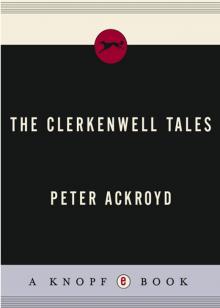 The Clerkenwell Tales
The Clerkenwell Tales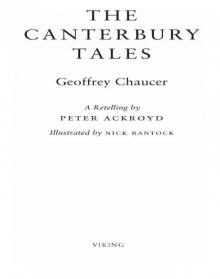 The Canterbury Tales
The Canterbury Tales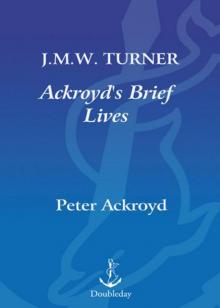 J. M. W. Turner
J. M. W. Turner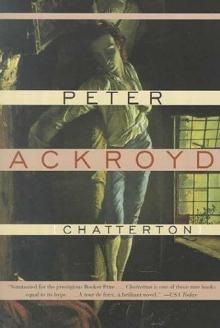 Chatterton
Chatterton The Canterbury Tales – A Retelling
The Canterbury Tales – A Retelling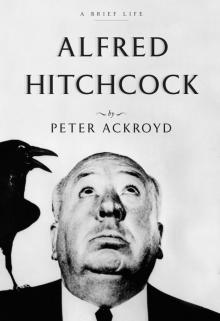 Alfred Hitchcock
Alfred Hitchcock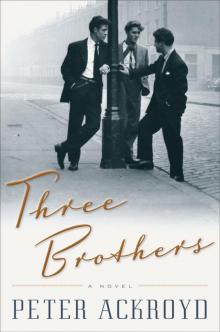 Three Brothers
Three Brothers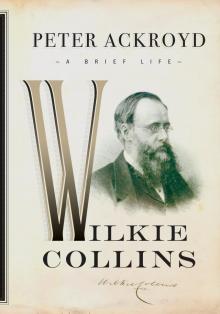 Wilkie Collins
Wilkie Collins Venice
Venice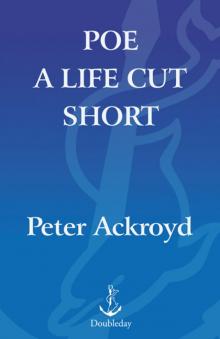 Poe
Poe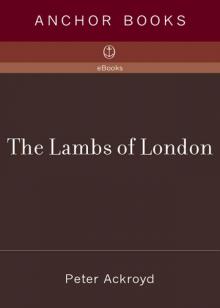 The Lambs of London
The Lambs of London London
London Queer City
Queer City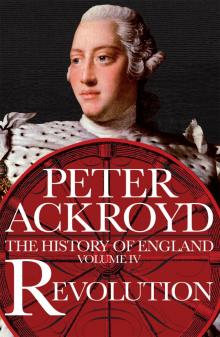 Revolution, a History of England, Volume 4
Revolution, a History of England, Volume 4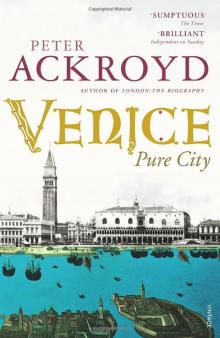 Venice: Pure City
Venice: Pure City Foundation
Foundation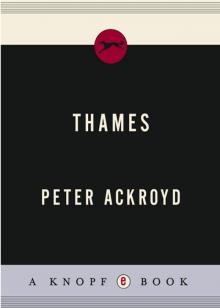 Thames
Thames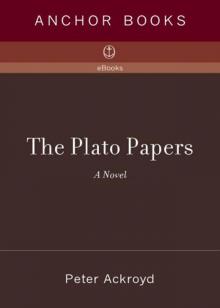 The Plato Papers
The Plato Papers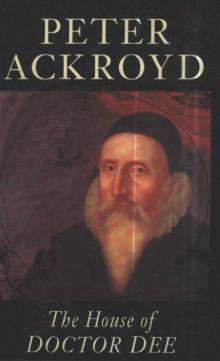 The house of Doctor Dee
The house of Doctor Dee Rebellion: The History of England from James I to the Glorious Revolution
Rebellion: The History of England from James I to the Glorious Revolution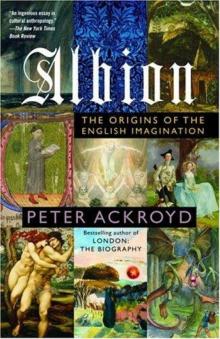 Albion: The Origins of the English Imagination
Albion: The Origins of the English Imagination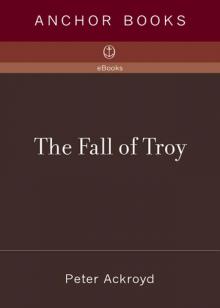 The Fall of Troy
The Fall of Troy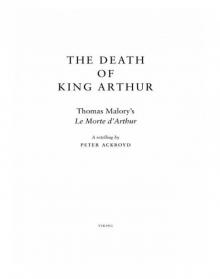 The Death of King Arthur
The Death of King Arthur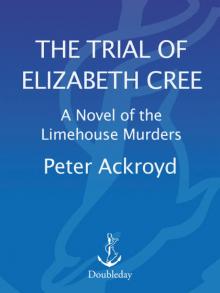 The Trial of Elizabeth Cree
The Trial of Elizabeth Cree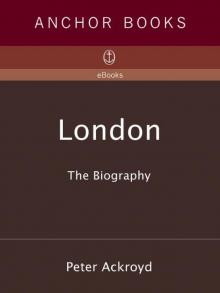 London: The Biography
London: The Biography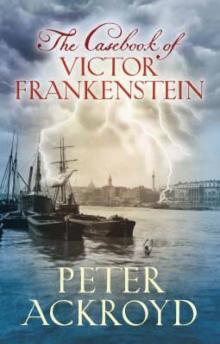 The Casebook of Victor Frankenstein
The Casebook of Victor Frankenstein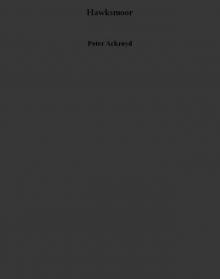 Hawksmoor
Hawksmoor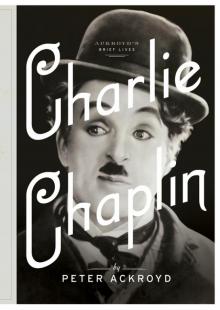 Charlie Chaplin
Charlie Chaplin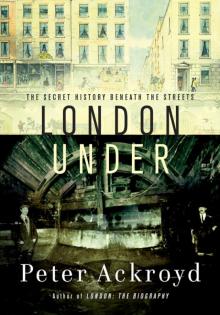 London Under
London Under